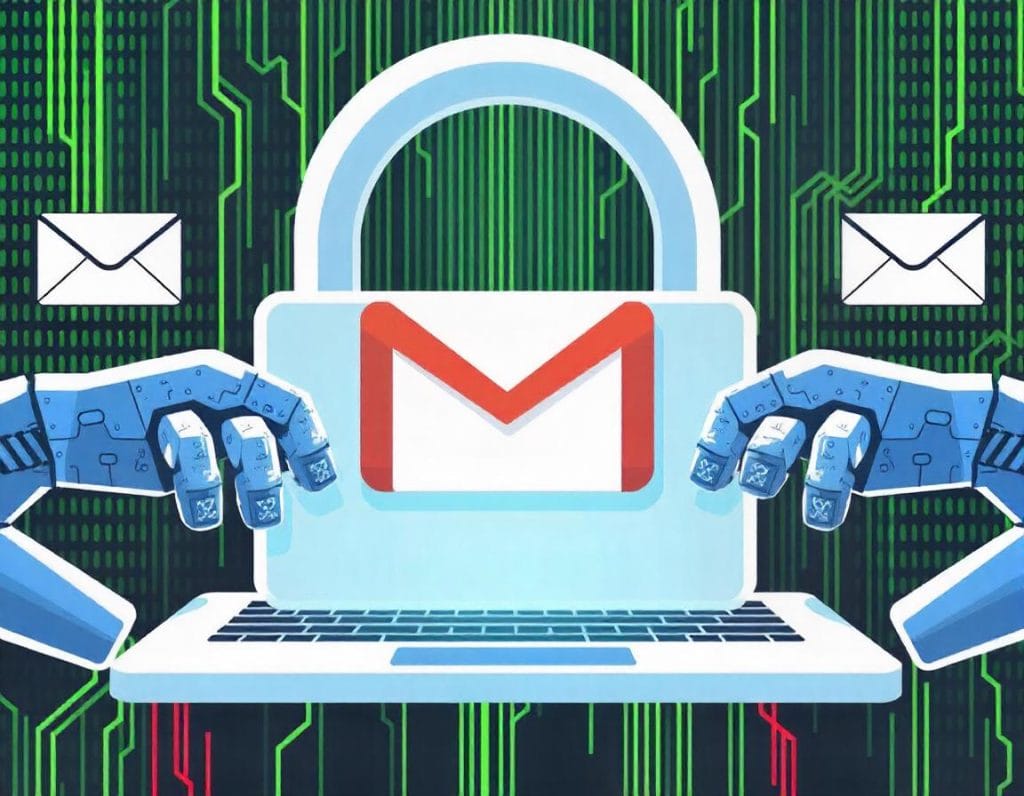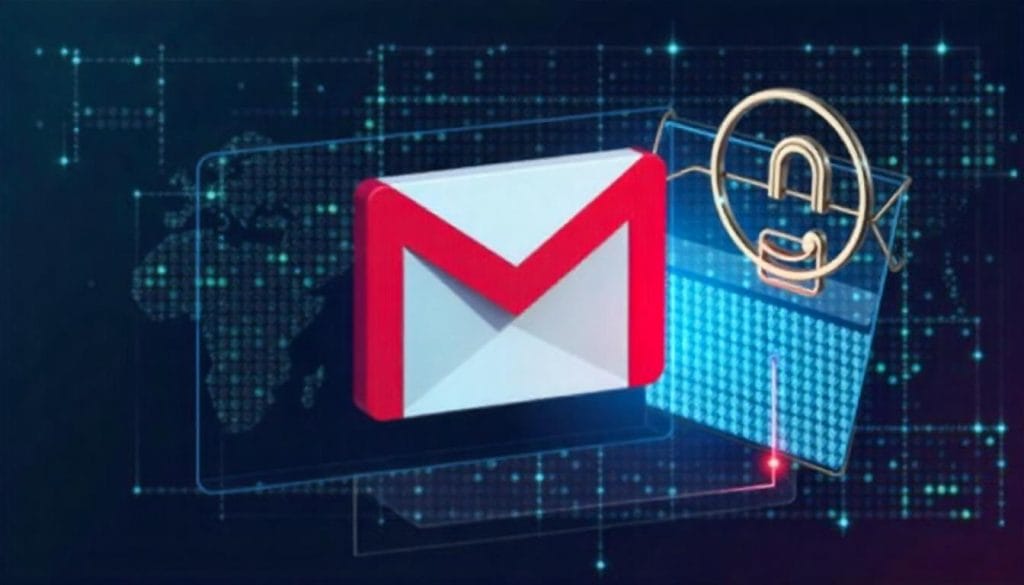Gmail Security Warning AI Attacks are currently a major problem as artificial intelligence (AI) brings a lot of changes to industries, including cybercrime. AI-powered threats now are more likely to succeed, harder to spot, and therefore, expose the individuals as well as the organizations to the risks. In order to combat these rising menace, Google has given Gmail users a security notice that deals with the issue of cyber attackers using AI. This alert draws attention to the threats powered by AI that simulate illegitimately and bypass traditional security barriers. Understanding Gmail security warning AI attacks is essential for users today.
Obtaining insights into the dangers of AI-augmented cyberattacks is the very thing that should be done both by individuals and businesses to remain ahead of bad players. This article is an analysis of Google’s Gmail security on AI attacks, hacker use of AI to find security vulnerabilities, and the right procedures to protect us from these threats.
The increasing prevalence of Gmail security warning AI attacks highlights the need for vigilance and proactive measures to protect sensitive information.
AI-Powered Cyber Attacks Explained
What Are AI-Based Cyber Attacks?
These AI threats result in various forms of Gmail security warning AI attacks that can disrupt personal and professional communications.
AI-based cyberattacks are hacking methods that use machine learning and AI programs to automate and upgrade cyber threats. One thing that makes them stand out from traditional attacks is that these AI-based techniques can learn and evolve on their own and therefore are very hard to spot and counter. These kinds of attacks might be phishing, malware distribution, and deepfake scams.
How Hackers Use AI to Bypass Security Measures
Cybercriminals are currently using AI to come up with more believable phishing emails, deepfake scams, and malware that security systems can hardly stop. AI-run applications could be able to:
- Create spoofing emails that can impersonate close contacts and seem trustworthy.
- Recode the malicious software on the fly to stay below the radar.
- Use sophisticated forgery technology to make it look like an officer and deceive employees into doing financial transactions or disclosing sensitive information to hackers.
- Utilize a script that will be capable of executing millions of password combinations rapidly to crack open the system.
Examples of AI-Generated Phishing Emails and Deepfake Scams
Right now, AI that generates phishing emails has become more capable to convince people than ever before. These actors do the necessary training so the clone can learn to write like the real person. As a result, they can play on your trust and make you do something you shouldn’t. This makes the email theft techniques to work at a higher success rate. The scammers not only steal them, they become their proxy to execute this crime impersonating legitimate users. Ignore and block them.
Some AI phishers fool the filters and lead security. Gmail victims report cunning AI-generated phishing acquires that easily get bypass hundreds of filters and security controls. It’s the fault of the scammers and there’s nothing Google can do about it. Users think they are clicking on legitimate links because the emails often seem like they are sent from a familiar name.
Awareness of Gmail security warning AI attacks can empower users to act quickly when faced with suspicious emails.
Gmail’s New Security Alert Explained
Individuals must be aware of Gmail security warning AI attacks and how they can affect their online safety.
Google’s Warning on AI-Based Cyber Threats
Software giant Google has professionalized the very best in online protection and security to date. Now, cybercriminals find it easier to fake individuals in online messaging in various ways. An example of this method is by making use of the brand investment to provide authentic-looking deceitful websites. Thus, eventually, the users would end up revealing their private details to the attacker who is trying to come across as if they are the bank itself and the recipient has a need for such Gmail security warning AI attacks.
- Use auto chat robots, that way the scams look more and more real.
- To elude detection, use one of the latest AI-driven technologies for encryption.
It is through these sophisticated methods that it has become harder for users to check if the emails are genuine or fake which, in turn, means both personal and business accounts are more prone to data breaches.

To protect against Gmail security warning AI attacks, users should be educated on recognizing potential threats.
How to Protect Yourself from AI-Powered Hacks
Steps to Enhance Gmail Security
One of the powerful tools of AI is hacking, so customers of Gmail must take the following steps to secure their accounts against AI-made cybercrimes:
Enable Two-Factor Authentication (2FA)
- Adds an extra layer of security by requiring a secondary verification step.
- Even if hackers steal your password, they will not gain access to your account without the second factor.
Adds an extra layer of security by requiring a secondary verification step.
- Even if hackers crack your password, they still cannot log in unless the second factor is entered.
- Use Strong and Unique passwords not use simple or easily guessable passwords. Try to use a password manager to not only create but also store strong passwords.
- Do not use common or easily guessable passwords.
- You could opt for a password manager to be prompt in the generation and storage of complex passwords.
Get the hang of AI-generated phishing
- Frauds Focus on requests that are out of the ordinary, grammatical errors, and anomalies in the sender’s address.
- Confirm the sender’s legitimacy by sending an email through a reliable channel.
- Spot the odd requests, grammatical errors, or mismatched sender addresses.
Assure sender authenticity by contacting them on a trusted channel.
- Manage Third-Party App Permissions Carry out frequent checks to deauthorize and delete access for any doubtful third-party applications that are associated with your Gmail account.
- Be restrictive in influencing the app by limiting the permissions that could potentially lead to unauthorized data access.
- Keep an eye on and disapprove the access to your email from suspicious 3rd party apps linked to your Gmail account at all times.
Refrain the application from accessing information you consider unnecessary.
- Utilize Google’s standardized security practices Activate the Google Incognito window feature to protect your credentials and prevent phishing threats.
- Make sure to turn on the security option called “Enhanced Safe Browsing” that is installed in the Google Chrome settings which scans the website to be a normal phishing site.
- Also, allow the spam filter on Gmail to check them by reporting them to Google first.
The Future of Artificial Intelligence in Cybersecurity
AI for Cybercrime vs. AI for Cyber Defense
Although AI technology is used in cybercrime, it is also now a crucial asset of cybersecurity. AI defense uses the technology to recognize threats in real-time, automate threat responses, and pinpoint cybercriminal activity by observing patterns.
Future Trends in AI-Powered Security Systems
Cybersecurity systems with the help of AI are the most developed areas and are likely to bring about such advancements:
- AI-powered behavioral analytics, a process that can work by recognizing suspicious behavior and stopping or preventing an attack.
- The next big step in the evolution of protection infrastructure is the automation of threat intelligence, which enables the prediction and treatment of security risks.
- Fast and accurate detection of deepfaking will be below the radar of fraudsters but above that of security as it is a new technology. Therefore, using advanced deepfake detection will be one way to prevent and detect identity theft and scams.
AI-driven security solutions are the best option for developers and organizations to stay on the winning side of the battle that is ongoing between cyber-criminals and security professionals.
Conclusion
Gmail security warning AI attacks vividly demonstrate the dangers of AI-driven cyber threats. The forthcoming years will see cybercriminals making more use of AI technologies to bypass security measures, and thus, both individuals and corporations need to be fully aware and carry out preventive security to thwart such AI attacks
By the application of efficient authentication processes, understanding AI-generated phishing, and taking advantage of Google’s built-in security, the users of Gmail shall be able to protect themselves from AI architectural cyber attacks.
Being informed and staying aware of the latest cybersecurity issues will be highly beneficial to the security of personal and business digital properties against the continuously changing evolution of AI-powered attacks and thus, would be taking the first step in to secure your Gmail account and avoid AI-driven attacks.
In conclusion, addressing Gmail security warning AI attacks is vital in safeguarding personal and business information in today’s digital landscape.

